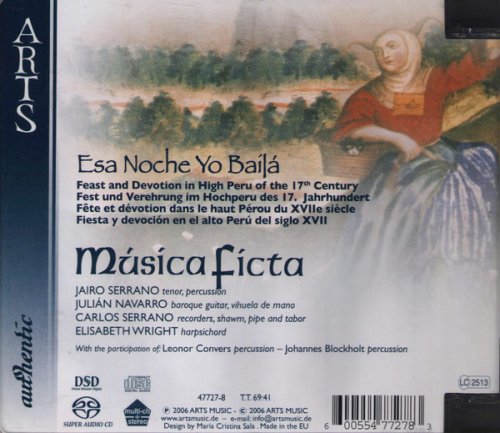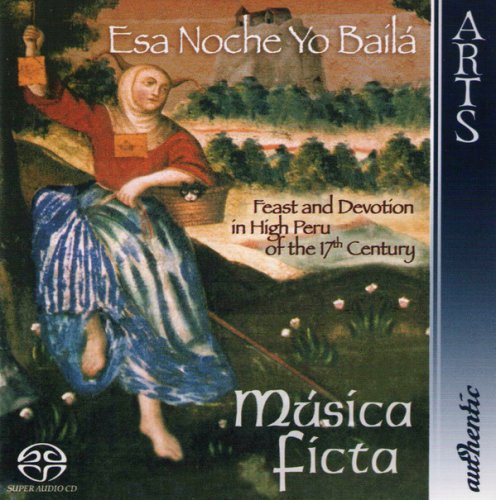
Música Ficta - Esa Noche Yo Baílá: Feast and Devotion in High Peru of the 17th Century (2006)
BAND/ARTIST: Música Ficta
- Title: Esa Noche Yo Baílá: Feast and Devotion in High Peru of the 17th Century
- Year Of Release: 2006
- Label: Arts Music
- Genre: Classical
- Quality: FLAC (image+.cue,log,scans)
- Total Time: 01:09:43
- Total Size: 354 MB
- WebSite: Album Preview
Tracklist:
Peruvian anonymous
[1] Tonada la lata
[2] Cachua al nacimiento de Christo Nuestro Señor
Santiago de Murcia (c.1682-c.1740)
[3] Marizápalos / Peruvian anonymous: Marizápalos
Juan Cabanilles (1644-1712)
[4] Tiento XXIV de falsas
José Marín (1618-1699)
[5] Desengañémonos ya
Pedro Ximénez (fl.1646-1668)
[6] Caballero de armas blancas
Francisco Guerau (1649-1722)
[7] Villano
José Marín
[8] Ojos pues me desdeñáis
[9] No piense Menguilla
Peruvian anonymous
[10] Zapateo
[11] María, todo es María
Juan Cabanilles
[12] Tiento XIII de dos tiples y dos baixos
Tomás de Herrera (fl.1611-1620)
[13] : Hijos de Eva tributarios
José Marín
[14] Tortolilla si no es por amor
Spanish anonymous (17th century)
[15] Pasacalles de primer tono I
Clemente Imaña (17th century)
[16] Filis yo tengo
Santiago de Murcia
[17] La jotta / Peruvian anonymous: Tonada la donosa
Spanish anonymous (17th century)
[18] Entrada de clarín antes de tocar canciones
Bolivian anonymous (17th century)
[19] Esa noche yo bailá
Peruvian anonymous (17th century)
[20] Don Pedro a quien los crueles

Peruvian anonymous
[1] Tonada la lata
[2] Cachua al nacimiento de Christo Nuestro Señor
Santiago de Murcia (c.1682-c.1740)
[3] Marizápalos / Peruvian anonymous: Marizápalos
Juan Cabanilles (1644-1712)
[4] Tiento XXIV de falsas
José Marín (1618-1699)
[5] Desengañémonos ya
Pedro Ximénez (fl.1646-1668)
[6] Caballero de armas blancas
Francisco Guerau (1649-1722)
[7] Villano
José Marín
[8] Ojos pues me desdeñáis
[9] No piense Menguilla
Peruvian anonymous
[10] Zapateo
[11] María, todo es María
Juan Cabanilles
[12] Tiento XIII de dos tiples y dos baixos
Tomás de Herrera (fl.1611-1620)
[13] : Hijos de Eva tributarios
José Marín
[14] Tortolilla si no es por amor
Spanish anonymous (17th century)
[15] Pasacalles de primer tono I
Clemente Imaña (17th century)
[16] Filis yo tengo
Santiago de Murcia
[17] La jotta / Peruvian anonymous: Tonada la donosa
Spanish anonymous (17th century)
[18] Entrada de clarín antes de tocar canciones
Bolivian anonymous (17th century)
[19] Esa noche yo bailá
Peruvian anonymous (17th century)
[20] Don Pedro a quien los crueles
This disc from the Bogotá, Colombia-based ensemble Música Ficta jumps on the fast-moving bandwagon carrying Baroque music from Latin America. It is billed, with unnecessary specificity, as covering "Feast and Devotion in High Peru of the seventeenth century," but like other releases in this general repertoire it ranges widely, including music from other Latin American countries and from Spain itself, and covering music of several centuries. The subtitle is a bit misleading but not seriously annoying, for all this music traveled quite a bit in its time, and all the lands that are individual countries today were simply part of New Spain. The music here has the attractive features we have come to know in releases devoted to similar repertory by Jordi Savall's Hesperion XX (Villancicos y danzas criollas), Andrew Lawrence-King, and other musicians: a lively formal openness that invites performer contributions, a terrific clash of sacred and secular elements, and, most unusually of all, a strong African influence in some pieces. The repertoire is growing as researchers come through monastery libraries and the like in search of new gems, and the African-type piece (track 19, the album's title track) performed by Música Ficta here, which comes from Bolivia, is a delightful one, a Christmas song with the unique mixture of party-hearty attitude and devotional reverence that marks other songs of this type. Its language, even filtered through notation by Bolivian monks, is a distinctly African-American form of Spanish.
Other intriguing works include a Peruvian take on one of the genuine hits of the era, Santiago de Murcia's Marizápalos. This song, nicely translated by recorder player Carlos Serrano and harpsichordist Elizabeth Wright, deals with a young woman, Marizápalos, who encounters a priest's son, Pedro Martín, for whom she has been longing. "All her virtue vanished," the narrator recounts (shades of "Son of a Preacher Man"!), and a series of sexual metaphors follows that is all the more suggestive for being a bit unclear at a remove of several centuries. Someone is going to have to explain the line about the parsley. But the best line pertains to a nearby creek, which is murmuring as the lovers approach, but begins to laugh "with closed teeth" when it sees them coming.
There are also simple sacred songs, keyboard pieces, and strophic love songs by the Spanish composer-murderer José Marín. The performances by Música Ficta are quieter than those of Hesperion XX, and tenor Jairo Serrano, often lightly accompanied by Baroque guitar or vihuela de mano, doesn't quite bring out the riotous spirit that lurks in this music. Yet an X factor works in Música Ficta's favor. The album is beautifully recorded in a Colombian church dating back to 1590, and Serrano's diction brings home the sense of the lyrics for those who pay attention to them. The epigram from Frank Zappa on the inside back cover of the booklet also has to count for something. A worthwhile entry into the growing library of performances of early music from Latin America.
Other intriguing works include a Peruvian take on one of the genuine hits of the era, Santiago de Murcia's Marizápalos. This song, nicely translated by recorder player Carlos Serrano and harpsichordist Elizabeth Wright, deals with a young woman, Marizápalos, who encounters a priest's son, Pedro Martín, for whom she has been longing. "All her virtue vanished," the narrator recounts (shades of "Son of a Preacher Man"!), and a series of sexual metaphors follows that is all the more suggestive for being a bit unclear at a remove of several centuries. Someone is going to have to explain the line about the parsley. But the best line pertains to a nearby creek, which is murmuring as the lovers approach, but begins to laugh "with closed teeth" when it sees them coming.
There are also simple sacred songs, keyboard pieces, and strophic love songs by the Spanish composer-murderer José Marín. The performances by Música Ficta are quieter than those of Hesperion XX, and tenor Jairo Serrano, often lightly accompanied by Baroque guitar or vihuela de mano, doesn't quite bring out the riotous spirit that lurks in this music. Yet an X factor works in Música Ficta's favor. The album is beautifully recorded in a Colombian church dating back to 1590, and Serrano's diction brings home the sense of the lyrics for those who pay attention to them. The epigram from Frank Zappa on the inside back cover of the booklet also has to count for something. A worthwhile entry into the growing library of performances of early music from Latin America.

Download Link Isra.Cloud
Música Ficta - Esa Noche Yo Baílá: Feast and Devotion in High Peru of the 17th Century (2006)
My blog
Música Ficta - Esa Noche Yo Baílá: Feast and Devotion in High Peru of the 17th Century (2006)
My blog
As a ISRA.CLOUD's PREMIUM member you will have the following benefits:
- Unlimited high speed downloads
- Download directly without waiting time
- Unlimited parallel downloads
- Support for download accelerators
- No advertising
- Resume broken downloads


